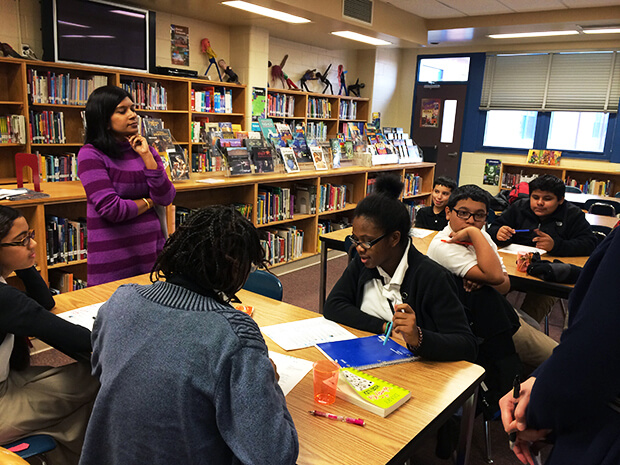- November 10, 2015
- By Natalie Koltun
Mega Subramaniam was used to seeing her children fluently navigate a new device within minutes of picking it up. But when the associate professor observed students at a low-income middle school during a lesson in their library, she was surprised to see how they lacked basic research skills and couldn’t figure out how to use computer programs and devices.
What if there was a more effective way to teach those skills to students? The secret, thought Subramaniam, would be to personalize a topic for them to explore.
Today, she and her team of researchers are in the third year of presenting their “HackHealth” program at Prince George’s County middle schools to show tweens how to research online health-related information, organize data and evaluate its credibility.
“Many of these students rely fully on schools to teach them these digital skills,” says Subramaniam, an associate professor in the College of Information Studies. “With 500 or more kids in each school, they can’t really get the full attention they need to catch up and excel, so we knew we needed to create a space specifically for that after school.”
Funded by the National Library of Medicine, the 12-week, afterschool program is free to students and has been implemented in five middle schools: Charles Carroll, Buck Lodge, William Wirt, Beltsville Academy and Robert Goddard Montessori.
While we think of children as digital natives, she says, students at these schools may come from families with limited access to computers, the Internet and other digital resources.
“When kids need information, they search for answers in the open Web, not databases and research findings,” says Subramaniam, associate director of UMD’s Information Policy and Access Center. “They’re going to use methods they’re already comfortable with, so our job is to educate how to do just that but in smarter ways.”
Libraries, Subramaniam says, are often a haven for teens during the unsupervised hours after school. Her team developed the program’s curriculum with the intent to one day expand to public libraries in the county, which she aims to launch within the next few years.
HackHealth succeeds in part due to its flexible, personal structure, the school librarians say. Rather than being assigned subjects to research, students explore a health issue of their choosing. Many, unsurprisingly, are drawn to topics that they or a family member have.
 “They were really excited to share with their peers what they go through,” says Melissa Bethea, library media specialist at Charles Carroll and Ernest Everett Just middle schools. “Here they learn how to research it themselves so they don’t have to always be dependent on others to teach them about the health condition they have.”
“They were really excited to share with their peers what they go through,” says Melissa Bethea, library media specialist at Charles Carroll and Ernest Everett Just middle schools. “Here they learn how to research it themselves so they don’t have to always be dependent on others to teach them about the health condition they have.”
She recalled how one student took the skills and information he learned about regulating his weight with healthy foods and incorporated that into his daily life.
“He came into the program wanting to learn more about healthy eating, but ended up transforming his entire family’s way of looking at food,” Bethea says.
The program, she added, is revolutionizing how research and digital skills are being taught in the formative 7th and 8th grades. But its curriculum lays the groundwork for libraries and allows them to customize the activities to align with the particular students participating.
At the final session, the students and their parents visit UMD’s Hornbake Library to share their projects using any medium, a suggestion they take to heart. The presentations vary wildly, from an interpretive dance exploring Kawasaki disease, a Prezi on Ebola and an original song about thyroid disease to an interview on discrimination against people with disabilities.
“At the end of the first year, we had several students come up to us and say they either wanted to do the program again or return as peer mentors,” she says. “This really told us that what we are doing is engaging these kids in their own health and making a lasting impact.”
